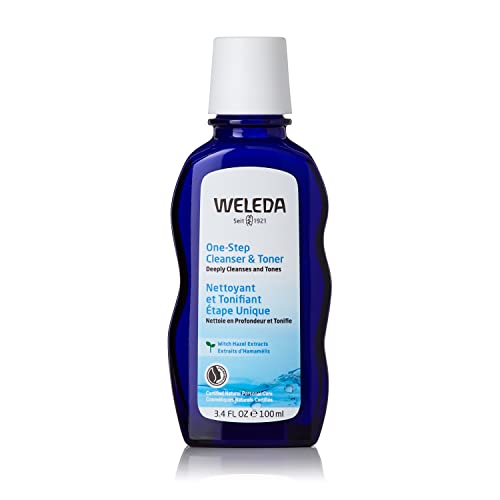
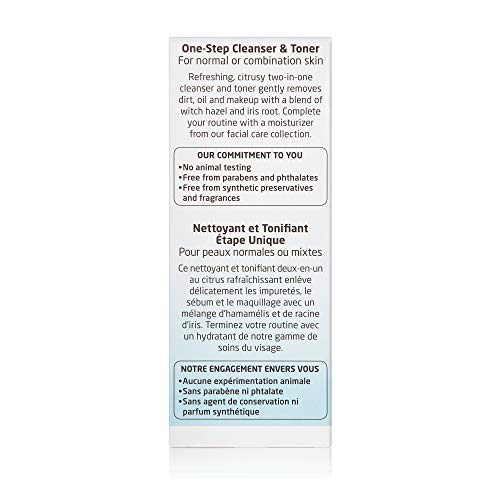
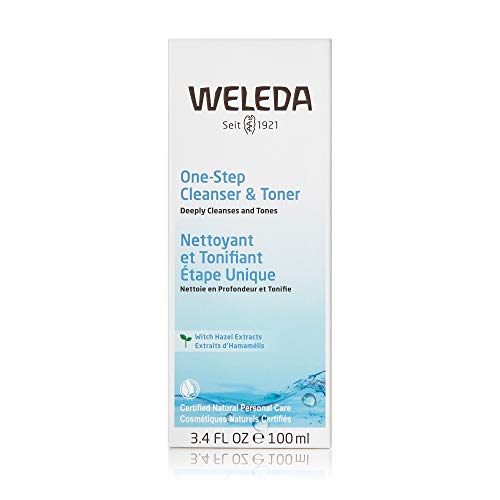
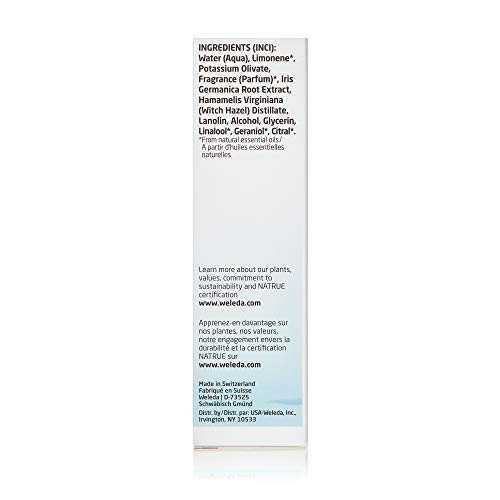
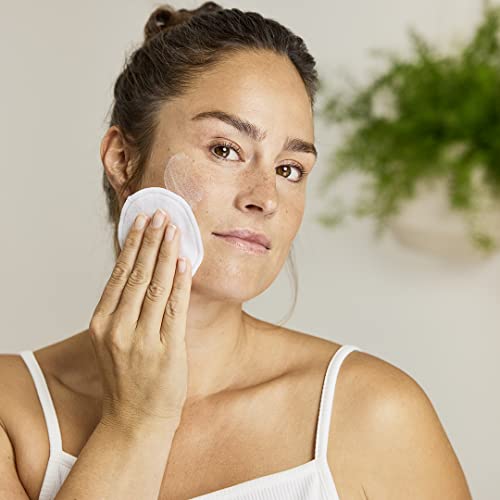
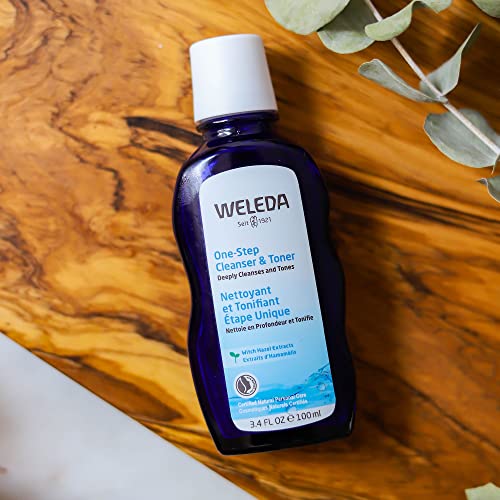
Weleda One-Step Face Cleanser & Toner - Deep Cleansing, Dermatologically Tested - 3.4oz


Linalool
High RiskLinalool is a terpene commonly found in various plants, particularly in lavender and mint. It is primarily used in products for its fragrance and potential antimicrobial properties. Linalool is also utilized in formulations for its ability to enhance the sensory experience of personal care and household products.
Sustai Insights
Linalool offers functional benefits as a naturally occurring fragrance component and may exhibit antimicrobial properties. However, it presents high allergenic potential, with concerns about skin irritation and sensitization. Environmental risks include contamination issues, though it is not classified as a persistent pollutant. Regulatory bodies have noted the need for careful handling due to its allergenic nature. Overall, despite some beneficial attributes, the ingredient carries a high risk profile, warranting cautious use and consideration of safer alternatives.
Geraniol
High RiskGeraniol is a naturally occurring scent ingredient commonly found in essential oils from plants such as geraniums and lemongrass. It is primarily used for its pleasant floral aroma in perfumes, cosmetics, and household products.
Sustai Insights
Geraniol serves as a fragrance component and offers a natural option for scenting products. However, it has a high allergenic potential and may cause skin irritation in sensitive individuals. While it is considered low risk for carcinogenicity and reproductive toxicity, regulatory bodies have placed restrictions on its use due to allergenic concerns. Overall, the assessment reflects a high-risk level, particularly for those prone to allergies, highlighting the need for caution in its application.
Lanolin Alcohol
Medium RiskLanolin alcohol is a mixture of organic alcohols derived from lanolin, the natural wax obtained from sheep's wool. It is commonly used in cosmetic formulations as an emollient and moisturizer, helping to improve skin texture and hydration.
Sustai Insights
Lanolin alcohol provides effective moisturizing properties, enhancing skin feel and barrier function. It is generally considered safe, with low concerns related to carcinogenicity and reproductive toxicity. However, it poses moderate allergenic potential and may cause irritation in sensitive individuals. Environmentally, it is deemed low risk, but regulatory restrictions apply to certain formulations. Overall, it has a medium risk profile, highlighting the importance of monitoring user reactions and considering alternatives like plant-based emollients.
Limonene
Medium RiskLimonene is a scent ingredient and solvent naturally found in citrus fruits, commonly used in personal care and cleaning products for its fragrant properties. It serves as a flavoring agent and enhances the overall sensory experience of products.
Sustai Insights
Limonene offers functional benefits such as acting as a solvent and fragrance enhancer. However, it carries a high allergenic potential, which can trigger skin or respiratory sensitivities in some individuals. Environmental concerns include moderate persistence and bioaccumulation, along with potential ecotoxicity. Regulatory restrictions necessitate verification in products containing this ingredient. Overall, the risk level is assessed as medium, emphasizing the importance of cautious use, particularly for sensitive populations. Safer alternatives may be considered to mitigate these risks.
Geranial
Medium RiskGeranial is a naturally occurring compound found in essential oils, primarily derived from lemongrass. It is commonly used in fragrances and flavoring due to its lemon-like scent. Geranial acts as a fragrance component and is often included in personal care and cosmetic products.
Sustai Insights
Geranial offers functional benefits as a fragrance enhancer in various products. While it is generally well-tolerated, it has a moderate allergenic potential, and caution is advised for sensitive individuals. Environmentally, it does not appear to be bioaccumulative, but its use is restricted in some verified products. Overall, the risk level is assessed as medium, suggesting that while it is useful, careful consideration of exposure is warranted.
Potassium Olivate
Low RiskPotassium olivate is a potassium salt derived from olive oil, primarily used in cosmetics for its emulsifying properties. It helps blend oil and water-based ingredients, enhancing the texture and stability of formulations.
Sustai Insights
Potassium olivate serves as an effective emulsifier, contributing to product stability and texture without significant health risks, categorized as low in carcinogenicity, allergenicity, and reproductive toxicity. Environmentally, it poses minimal risks as it is biodegradable and sustainably sourced. Regulatory bodies do not impose significant restrictions. Safe usage practices are encouraged, and alternatives like other plant-derived emulsifiers are available. Overall, the ingredient holds a low risk assessment.
Hamamelis Virginiana (Witch Hazel) Distillate
Low RiskHamamelis virginiana (witch hazel) distillate is a plant-derived extract commonly used in cosmetic formulations for its astringent and soothing properties. It is primarily utilized for its ability to reduce inflammation and tighten skin, making it a popular ingredient in toners and aftershaves.
Sustai Insights
Witch hazel distillate exhibits several functional benefits, including its anti-inflammatory and astringent properties, which are beneficial for skin care. It is considered to have low health risks regarding carcinogenicity, allergies, and reproductive toxicity, with enhanced skin absorption being noted. Environmental concerns are minimal, as it is not classified as a pollutant or bioaccumulative. Regulatory bodies do not impose significant restrictions on its use. Overall, it is assessed as low risk, with recommendations for safe application in cosmetic products and consideration of alternatives like chamomile extract for similar benefits.
Water
Low RiskWater is a clear, colorless liquid essential for various biological processes. It serves as a solvent in formulations, facilitating the dissolution of other ingredients and enhancing product texture and application. Additionally, water plays a crucial role in hydration and is a key component in many cosmetic and personal care products.
Sustai Insights
Water is an effective solvent and hydrator, contributing to the texture and efficacy of formulations. It is biodegradable and generally regarded as safe, with low concerns regarding carcinogenicity, allergies, and reproductive toxicity. However, excessive water usage can lead to environmental concerns, particularly regarding resource depletion. Regulatory bodies do not impose restrictions on water use in cosmetics. Overall, the risks associated with water are low, making it a safe and essential ingredient.
Vegetarian Glycerin
Low RiskVegetarian glycerin, also known as glycerol, is a colorless, odorless, and viscous liquid derived from plant sources. It is primarily used as a humectant, solvent, and emollient in various personal care products, helping to retain moisture and improve texture.
Sustai Insights
Vegetarian glycerin offers functional benefits as an effective humectant, promoting hydration and skin smoothness. It is biodegradable and typically sustainably sourced. Health risks associated with glycerin are low, with no significant concerns for carcinogenicity, allergens, or reproductive toxicity. Environmental risks are minimal, and it is not subject to major regulatory warnings. Overall, the risk level for this ingredient is low, making it a safe choice in formulations. Safe usage practices include ensuring proper concentrations in products, and alternatives such as propylene glycol exist but may have differing properties.
Potassium Olivate
Low RiskPotassium olivate is a potassium salt derived from olive oil, primarily used in cosmetics for its emulsifying properties. It helps blend oil and water-based ingredients, enhancing the texture and stability of formulations.
Sustai Insights
Potassium olivate serves as an effective emulsifier, contributing to product stability and texture without significant health risks, categorized as low in carcinogenicity, allergenicity, and reproductive toxicity. Environmentally, it poses minimal risks as it is biodegradable and sustainably sourced. Regulatory bodies do not impose significant restrictions. Safe usage practices are encouraged, and alternatives like other plant-derived emulsifiers are available. Overall, the ingredient holds a low risk assessment.
Linalool
High RiskLinalool is a terpene commonly found in various plants, particularly in lavender and mint. It is primarily used in products for its fragrance and potential antimicrobial properties. Linalool is also utilized in formulations for its ability to enhance the sensory experience of personal care and household products.
Sustai Insights
Linalool offers functional benefits as a naturally occurring fragrance component and may exhibit antimicrobial properties. However, it presents high allergenic potential, with concerns about skin irritation and sensitization. Environmental risks include contamination issues, though it is not classified as a persistent pollutant. Regulatory bodies have noted the need for careful handling due to its allergenic nature. Overall, despite some beneficial attributes, the ingredient carries a high risk profile, warranting cautious use and consideration of safer alternatives.
Hamamelis Virginiana (Witch Hazel) Distillate
Low RiskHamamelis virginiana (witch hazel) distillate is a plant-derived extract commonly used in cosmetic formulations for its astringent and soothing properties. It is primarily utilized for its ability to reduce inflammation and tighten skin, making it a popular ingredient in toners and aftershaves.
Sustai Insights
Witch hazel distillate exhibits several functional benefits, including its anti-inflammatory and astringent properties, which are beneficial for skin care. It is considered to have low health risks regarding carcinogenicity, allergies, and reproductive toxicity, with enhanced skin absorption being noted. Environmental concerns are minimal, as it is not classified as a pollutant or bioaccumulative. Regulatory bodies do not impose significant restrictions on its use. Overall, it is assessed as low risk, with recommendations for safe application in cosmetic products and consideration of alternatives like chamomile extract for similar benefits.
Geraniol
High RiskGeraniol is a naturally occurring scent ingredient commonly found in essential oils from plants such as geraniums and lemongrass. It is primarily used for its pleasant floral aroma in perfumes, cosmetics, and household products.
Sustai Insights
Geraniol serves as a fragrance component and offers a natural option for scenting products. However, it has a high allergenic potential and may cause skin irritation in sensitive individuals. While it is considered low risk for carcinogenicity and reproductive toxicity, regulatory bodies have placed restrictions on its use due to allergenic concerns. Overall, the assessment reflects a high-risk level, particularly for those prone to allergies, highlighting the need for caution in its application.
Lanolin Alcohol
Medium RiskLanolin alcohol is a mixture of organic alcohols derived from lanolin, the natural wax obtained from sheep's wool. It is commonly used in cosmetic formulations as an emollient and moisturizer, helping to improve skin texture and hydration.
Sustai Insights
Lanolin alcohol provides effective moisturizing properties, enhancing skin feel and barrier function. It is generally considered safe, with low concerns related to carcinogenicity and reproductive toxicity. However, it poses moderate allergenic potential and may cause irritation in sensitive individuals. Environmentally, it is deemed low risk, but regulatory restrictions apply to certain formulations. Overall, it has a medium risk profile, highlighting the importance of monitoring user reactions and considering alternatives like plant-based emollients.
Limonene
Medium RiskLimonene is a scent ingredient and solvent naturally found in citrus fruits, commonly used in personal care and cleaning products for its fragrant properties. It serves as a flavoring agent and enhances the overall sensory experience of products.
Sustai Insights
Limonene offers functional benefits such as acting as a solvent and fragrance enhancer. However, it carries a high allergenic potential, which can trigger skin or respiratory sensitivities in some individuals. Environmental concerns include moderate persistence and bioaccumulation, along with potential ecotoxicity. Regulatory restrictions necessitate verification in products containing this ingredient. Overall, the risk level is assessed as medium, emphasizing the importance of cautious use, particularly for sensitive populations. Safer alternatives may be considered to mitigate these risks.
Water
Low RiskWater is a clear, colorless liquid essential for various biological processes. It serves as a solvent in formulations, facilitating the dissolution of other ingredients and enhancing product texture and application. Additionally, water plays a crucial role in hydration and is a key component in many cosmetic and personal care products.
Sustai Insights
Water is an effective solvent and hydrator, contributing to the texture and efficacy of formulations. It is biodegradable and generally regarded as safe, with low concerns regarding carcinogenicity, allergies, and reproductive toxicity. However, excessive water usage can lead to environmental concerns, particularly regarding resource depletion. Regulatory bodies do not impose restrictions on water use in cosmetics. Overall, the risks associated with water are low, making it a safe and essential ingredient.
Vegetarian Glycerin
Low RiskVegetarian glycerin, also known as glycerol, is a colorless, odorless, and viscous liquid derived from plant sources. It is primarily used as a humectant, solvent, and emollient in various personal care products, helping to retain moisture and improve texture.
Sustai Insights
Vegetarian glycerin offers functional benefits as an effective humectant, promoting hydration and skin smoothness. It is biodegradable and typically sustainably sourced. Health risks associated with glycerin are low, with no significant concerns for carcinogenicity, allergens, or reproductive toxicity. Environmental risks are minimal, and it is not subject to major regulatory warnings. Overall, the risk level for this ingredient is low, making it a safe choice in formulations. Safe usage practices include ensuring proper concentrations in products, and alternatives such as propylene glycol exist but may have differing properties.
Geranial
Medium RiskGeranial is a naturally occurring compound found in essential oils, primarily derived from lemongrass. It is commonly used in fragrances and flavoring due to its lemon-like scent. Geranial acts as a fragrance component and is often included in personal care and cosmetic products.
Sustai Insights
Geranial offers functional benefits as a fragrance enhancer in various products. While it is generally well-tolerated, it has a moderate allergenic potential, and caution is advised for sensitive individuals. Environmentally, it does not appear to be bioaccumulative, but its use is restricted in some verified products. Overall, the risk level is assessed as medium, suggesting that while it is useful, careful consideration of exposure is warranted.
Discover the Weleda One-Step Face Cleanser & Toner, a versatile 3.4 oz solution designed for normal to combination skin. This dual-action cleanser effectively removes makeup and impurities while toning your skin, leaving it refreshed and visibly improved.
- Deep Cleansing & Toning: Combines cleansing and toning in one easy step, enhancing your skincare routine.
- Gentle on Skin: Dermatologically tested formula soothes and refreshes, making it ideal for daily use.
- Natural Ingredients: Formulated with Iris Root Extract and Witch Hazel, promoting healthy skin without harsh chemicals.
- Easy Application: Simply wet your face, apply, massage, rinse, and pat dry for a quick clean.
- Versatile Use: Pairs perfectly with other Weleda skincare products, enhancing overall effectiveness and benefits.
Embrace a cleaner, healthier skincare routine with Weleda, committed to sustainable practices and quality ingredients.
Subscribe & Save with Sustai
- Best Price Guarantee: Always enjoy the lowest prices on sustainable home essentials.
- No Surprises: We’ll notify you before shipping. No hidden fees, ever.
- You’re in Charge: Change, pause, or cancel your subscription anytime with ease.
- Eco-Friendly Deliveries: Our grouped shipments mean less packaging and lower emissions.
Join us on a sustainable journey. Special offers for a limited time! Prices and promotions may change.
Recommended Products
Discover the Weleda One-Step Face Cleanser & Toner, a versatile 3.4 oz solution designed for normal to combination skin. This dual-action cleanser effectively removes makeup and impurities while toning your skin, leaving it refreshed and visibly improved.
- Deep Cleansing & Toning: Combines cleansing and toning in one easy step, enhancing your skincare routine.
- Gentle on Skin: Dermatologically tested formula soothes and refreshes, making it ideal for daily use.
- Natural Ingredients: Formulated with Iris Root Extract and Witch Hazel, promoting healthy skin without harsh chemicals.
- Easy Application: Simply wet your face, apply, massage, rinse, and pat dry for a quick clean.
- Versatile Use: Pairs perfectly with other Weleda skincare products, enhancing overall effectiveness and benefits.
Embrace a cleaner, healthier skincare routine with Weleda, committed to sustainable practices and quality ingredients.

You can have at most 2 Sustainable Steals products in your cart
Customer Reviews
Customers’ View
Customers appreciate the effectiveness and gentle nature of Weleda's Face Cleanser & Toner, highlighting its ability to cleanse without drying the skin. Many users note that it leaves their skin feeling soft, nourished, and well-hydrated, with one customer mentioning a significant improvement in skin conditions like rosacea. The product's pleasant scent and mild formula make it suitable for sensitive skin, further enhancing its appeal. Additionally, its eco-friendly formulation crafted with sustainable ingredients aligns well with health-conscious values. Overall, customers find this product effective in simplifying their skincare routine while promoting a refreshed and balanced complexion.
AI-generated from the text of customer reviewsThis product has no reviews yet.




